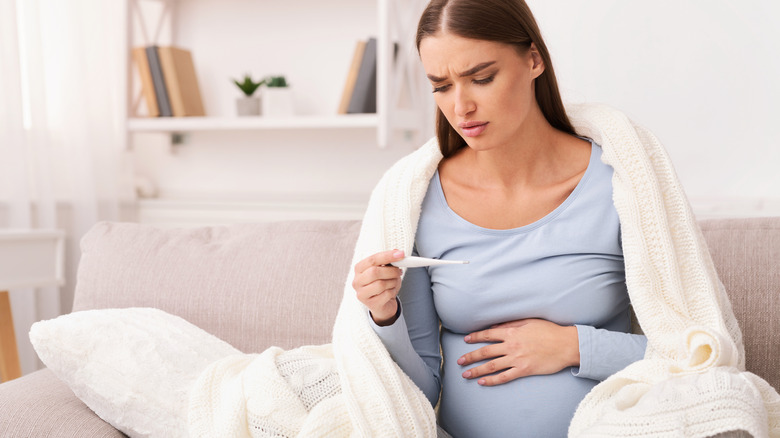How To Safely Reduce Your Fever While Pregnant
During pregnancy, getting sick is the last thing any expectant mother wants, knowing full well anything that happens to her can affect her baby as well. Even so, there's no way to predict when you'll get sick, and it's certainly possible that a fever could show up at someone's door unannounced during a pregnancy. To make things more difficult, the body's immune system weakens during pregnancy, which can make pregnant women more vulnerable to fevers caused by illnesses like urinary tract infections (UTIs), food poisoning, or the flu, according to BabyCenter.
If a fever does come about while you're pregnant, you should first know how to recognize it. As explained by Pampers, pregnant women can experience hot flashes from hormonal fluctuations in the body that raise their body temperature. This can make determining whether you're sick with a fever or experiencing normal symptoms of pregnancy more challenging. You should take your temperature with a thermometer whenever you're feeling unwell, keeping in mind that anything over 100.4 degrees Fahrenheit means you have a fever. In addition to increased body temperature, other symptoms can indicate a fever, such as chills, back pain, abdominal pain, and difficulty breathing.
Once you know you have a fever, you can take steps to alleviate it. Typically, a fever can be reduced with medications. However, there are other actions you can take at home to break your fever and care for yourself while you're sick.
What you should do if you have a fever during pregnancy
Usually, our first instinct when we aren't pregnant is to reach for the nearest over-the-counter pain reliever in our cabinet. When you're pregnant, it isn't recommended to take Advil, Motrin, or herbal remedies to relieve your fever, as explained by The Bump. Instead, you should stick to taking Tylenol. As you bring down your fever, Julie Lamppa, CNM, APRN, and certified nurse midwife suggests staying well-rested, drinking lots of fluids, and keeping an eye out for any unusual symptoms, like contractions or your baby not moving around as much as usual.
Rinsing a washcloth in cool water and applying it to your forehead can help lower your body temperature as you rest and recover (via BabyCenter). To decrease your body temperature in a safe way, you can cool down the room with a low-powered fan, put on light layers of clothing, and take a bath in lukewarm water. If you take a bath in cold water, you may get chills, which can increase your body temperature. Since having a fever is a symptom of illness, the root of the symptom must be treated as well, as Peanut points out.
After all, there have been a number of studies investigating whether babies born from mothers who had fevers during pregnancy are more likely to have health problems. Therefore, being met with a fever can make a pregnant woman worry about how her sickness may impact the health of her baby.
Does a fever during pregnancy have negative effects on an unborn child?
It's understandable that mothers-to-be would want to know how a fever during pregnancy influences the health of their baby. As explained by Peanut, most pregnant women who have a fever during their pregnancy deliver healthy babies after they recover. Nevertheless, some researchers have investigated whether there's an association between fevers while pregnant and certain health issues.
One 2021 meta-analysis published in Molecular Autism examined conflicting research about whether fever during pregnancy contributes to neurodevelopmental disorders. The data concluded the potential for an increased risk of neurodevelopmental disorders, particularly when the fever occurred during the first trimester of pregnancy. However, it's important to note that this research is inconclusive and had limitations. There has also been some concern that fevers during the first trimester may increase the risk of neural tube defects, but taking 400 micrograms of folic acid daily can protect your baby from brain and spinal cord defects in such cases (per March of Dimes).
For the vast majority of women, fevers during pregnancy shouldn't contribute to health problems for their newborns, and more research needs to be conducted to better understand the potential link. While it's normal to be concerned about your baby's health following recovery from a fever, there should be no need to worry if you get regular check-ups from your doctor and keep an eye out for any unusual symptoms of illness.



